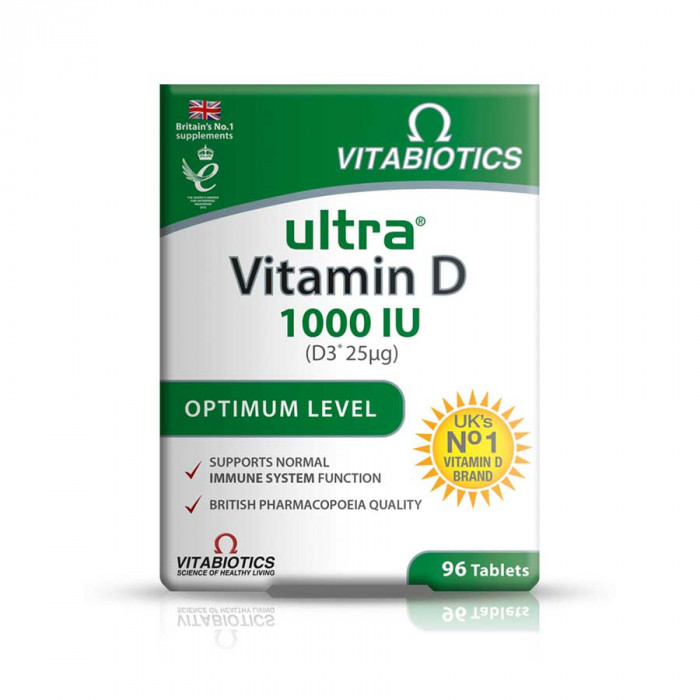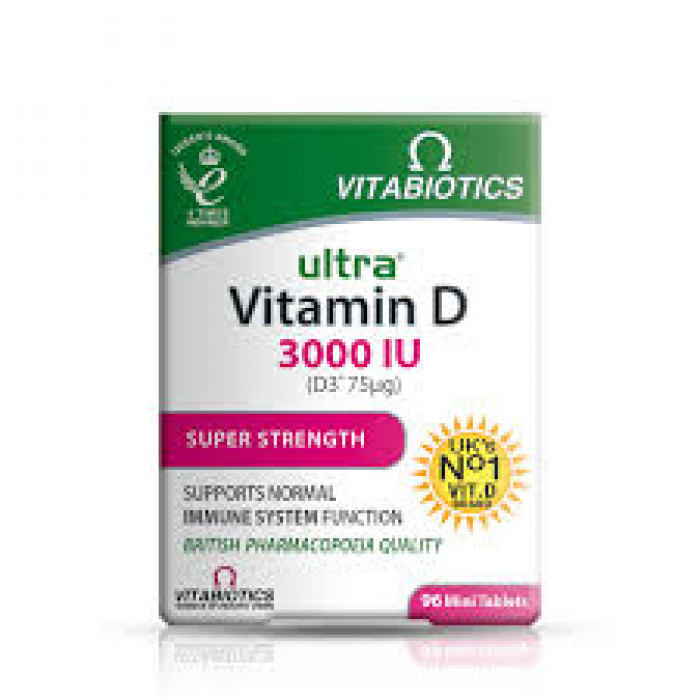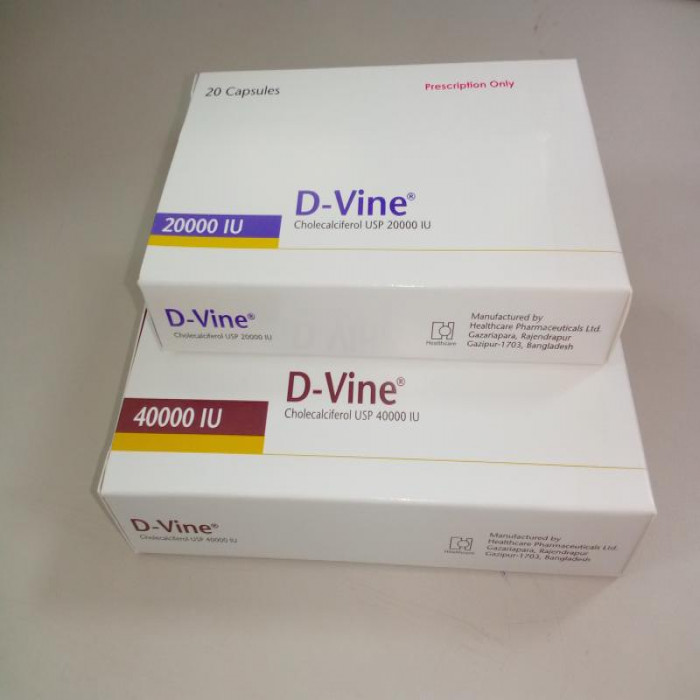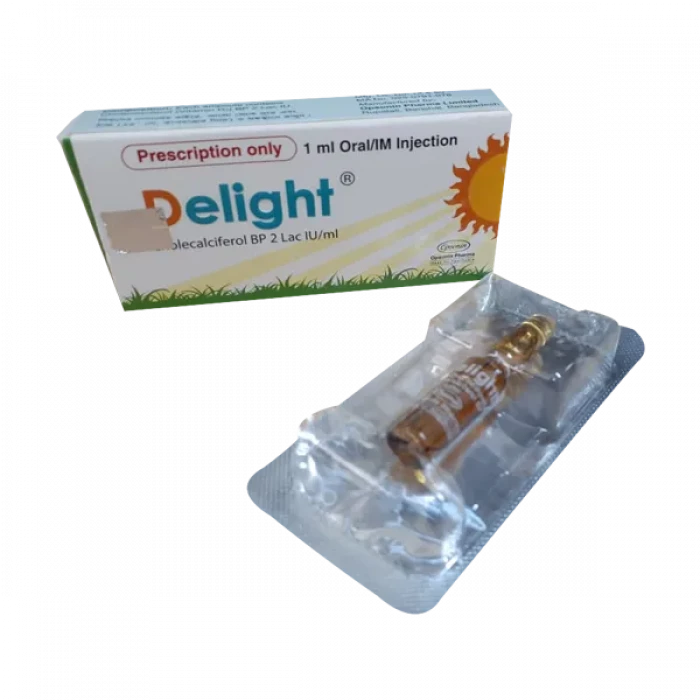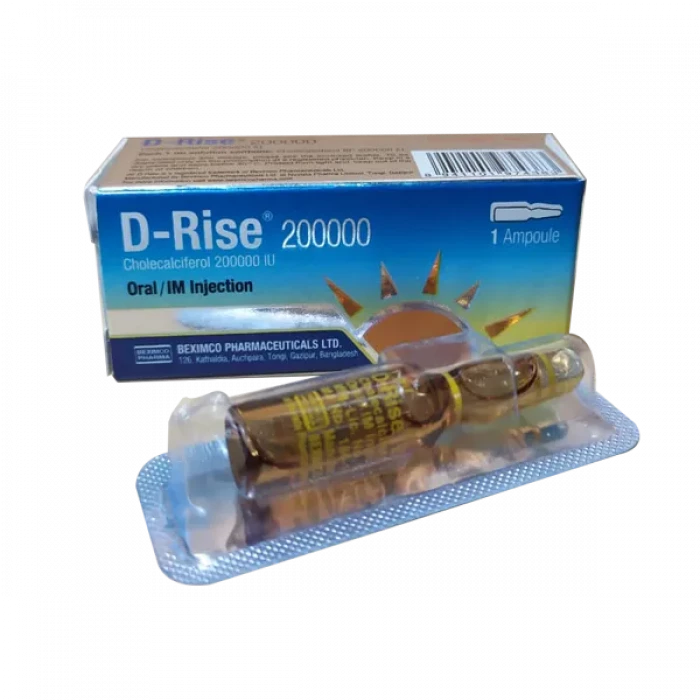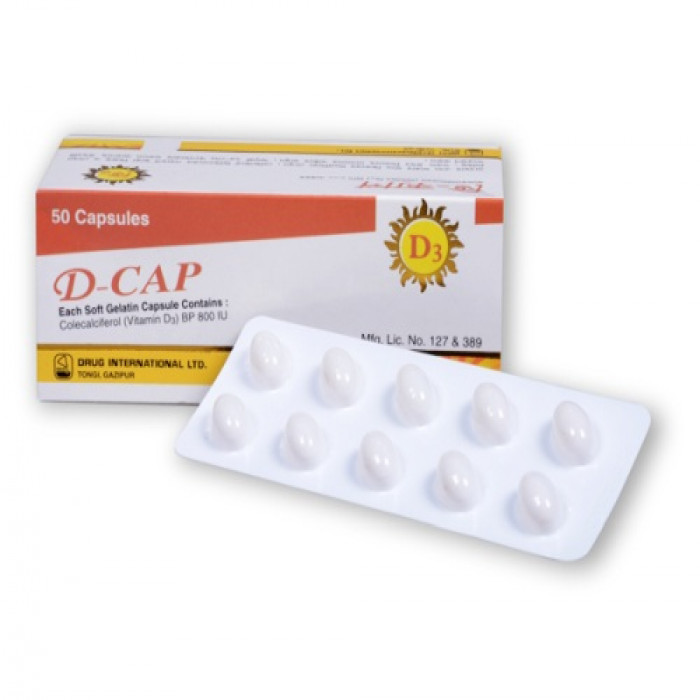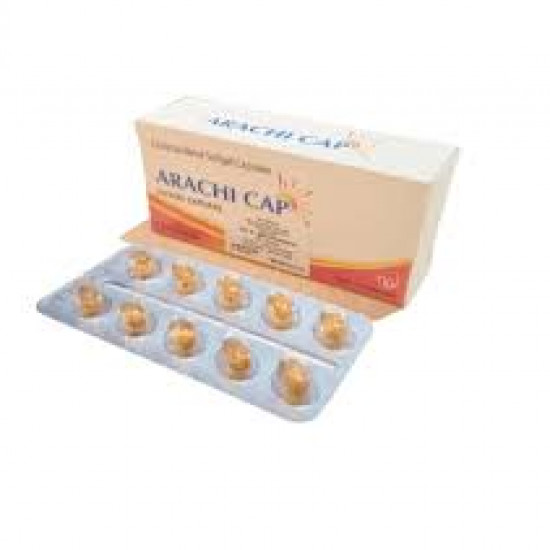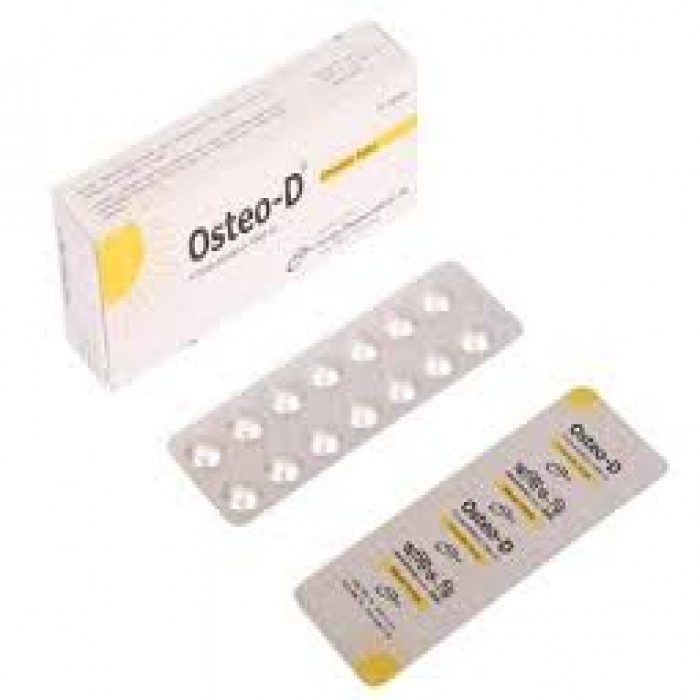
✔ 100% Authentic Product
👁️ Currently Viewing 4312
Osteo-D 1000IU Tablet 14Pcs
- Osteo-D 1000IU [Cholecalciferol (Vit. D3)]Tablet is a vitamin D formulation used to treat vitamin D insufficiency and related disorders. It is strong enough to cure hypocalcemia, a disorder defined by low calcium levels in the blood serum. This can be a major problem since low calcium levels can lead bones to produce calcium in the body. As a result of the response, bone mass is lost and the bone structure is compromised overall.
- Vitamin D3 is available in various forms like capsules, tablets, granules, dispersible tablets, mouth-dissolving tablets, injections, oral drops, solutions, sprays, and orally disintegrating films. For oral forms, take this medicine as instructed by your doctor. For the ease of remembering, try taking it at the same time every day. Avoid the discontinuation of this medicine without consulting your doctor.
- Osteo-D 1000IU Tablet is not recommended if you have kidney stones, or high calcium or vitamin D3 levels in your body. Inform your doctor about all your current medicine as they can interact with Vitamin D3 and increase the risk of side effects. Use this medicine with caution if you have pre-existing kidney problems. If you are pregnant or breastfeeding, consult your doctor before taking this medicine.
Discount
Price: ৳ 80
MRP:
৳
84
5%
Off

100% Genuine Products, Guaranteed

Safe & Secure Payments, Always

Fast, Secure & Efficient Delivery

Proper Packaging
 Cash on Delivery - All over Bangladesh
Cash on Delivery - All over Bangladesh Regular Delivery - 12-24 Hours, Dhaka City* Charge Tk.39-59
Regular Delivery - 12-24 Hours, Dhaka City* Charge Tk.39-59 Regular Delivery - 24-48 Hours, Other Cities* Charge Tk.99-110
Regular Delivery - 24-48 Hours, Other Cities* Charge Tk.99-110
 ফ্রি ডেলিভারিঃ - ৯৯৯ টাকা+ অর্ডারে, ঢাকা
শহরে
ফ্রি ডেলিভারিঃ - ৯৯৯ টাকা+ অর্ডারে, ঢাকা
শহরে ফ্রি ডেলিভারিঃ - ২৯৯৯ টাকা+ অর্ডারে, ঢাকার
বাহিরে
ফ্রি ডেলিভারিঃ - ২৯৯৯ টাকা+ অর্ডারে, ঢাকার
বাহিরে
100% Genuine Products, Guaranteed
Safe & Secure Payments, Always
Fast, Secure & Efficient Delivery
Proper Packaging
 Cash on Delivery - All over Bangladesh
Cash on Delivery - All over Bangladesh Regular Delivery - 12-24 Hours, Dhaka City* Charge Tk.39-59
Regular Delivery - 12-24 Hours, Dhaka City* Charge Tk.39-59 Regular Delivery - 24-48 Hours, Other Cities* Charge Tk.99-110
Regular Delivery - 24-48 Hours, Other Cities* Charge Tk.99-110 ফ্রি ডেলিভারিঃ - ৯৯৯ টাকা+ অর্ডারে, ঢাকা
শহরে
ফ্রি ডেলিভারিঃ - ৯৯৯ টাকা+ অর্ডারে, ঢাকা
শহরে ফ্রি ডেলিভারিঃ - ২৯৯৯ টাকা+ অর্ডারে, ঢাকার
বাহিরে
ফ্রি ডেলিভারিঃ - ২৯৯৯ টাকা+ অর্ডারে, ঢাকার
বাহিরে
✅ Description:
Cholecalciferol (Vitamin D3) is used to treat and prevent vitamin D3 insufficiency. It is also recommended as an adjuvant to specialized osteoporosis therapy in individuals with vitamin D3 insufficiency.
Safety Advices

Alcohol
UNSAFE
Drinking alcohol can affect calcium absorption, hence it is advised to limit the alcohol intake while using Osteo-D 1000IU Tablet.

Pregnancy
CAUTION
During pregnancy, use higher doses of Osteo-D 1000IU Tablet than the daily dietary allowance only when advised by the doctor. Your physician will weigh the potential risks and benefits before recommending Osteo-D 1000IU Tablet.

Breastfeeding
CAUTION
Consult your physician before taking Osteo-D 1000IU Tablet if you are breastfeeding. Osteo-D 1000IU Tablet can pass into the breast milk. If Osteo-D 1000IU Tablet is used during breastfeeding, please monitor the mother and the infant's serum calcium levels.

Driving
If you experience any dizziness while using Osteo-D 1000IU Tablet do not drive or operate machinery. Please consult your doctor if you experience any dizziness.

Kidney
CAUTION
It is advised to seek physician advice before starting Osteo-D 1000IU Tablet if you have kidney diseases like kidney stones or undergoing dialysis. Caution should be taken in patients undergoing dialysis to maintain adequate phosphorus levels and avoid ectopic calcification (calcium deposition).

Liver
CAUTION
Let your physician know if you have any history of liver diseases before taking Osteo-D 1000IU Tablet. Hepatic impairment/liver disease can alter the metabolic and therapeutic activity of certain Vitamin D forms.
✔️ Key Ingredients:
• Cholecalciferol 10000 IU
✔️ Uses of Osteo-D 1000IU Tablet
- Vitamin D deficiency
- Osteoporosis
- Hypoparathyroidism
- Osteomalacia and Rickets (bone disease due to Vitamin D deficiency)
- Rickets
✔️ Side Effcets of Osteo-D 1000IU Tablet
- Increased blood calcium levels
- Increased calcium levels in urine
- Skin rash, hives, or itching
- Confusion
- Constipation
✔️ Quick Suggestions:
- Cholecalciferol is the best-absorbed form of D3 vitamin supplement: This vitamin D is in cholecalciferol form, the most active and stable form of D3. This form sourced has the highest bioavailability and best absorption
- Chew only one tablet per week to solve D3 issues
- Boost immunity, mood, and muscle function: Having healthy vitamin D levels does more than support a healthy immune system. It also directly affects the health and expression of more than 2000 genes in your body, which has been shown to help improve mood and mental well-being, muscle function, cardiovascular health, respiratory system health, and brain health
- Supports strong bones and better calcium absorption: Vitamin D3 supplement helps maintain optimum bone density by helping you absorb your calcium better
✔️ Indications of Osteo-D Orally Dispersible Tablet
- Helpful in treating Vitamin D deficiency
- Treats low levels of calcium in blood serum
- Prevents the chances of contracting osteoporosis and bone disorder
- Helpful also in the treatment and prevention of rickets. Vitamin D deficiency is the main cause of rickets.
- Lack of Vitamin D in the body can also cause severe psychological issues such as depression and anxiety. Osteo-D 1000IU Tablet is a potent Vitamin D supplement and it can prevent the chances of depression
✔️ Pharmacology
Cholecalciferol (Vitamin D3) aids in calcium and phosphorus absorption and reabsorption. Vitamin D3 is required for proper bone development and bone density maintenance. It also lessens the severity of bacterial infections, improves lung function, lowers the risk of cancer (breast, colorectal), and aids in the maintenance of normal insulin levels in type 2 diabetic patients.
✔️ Dosage and Administration of Osteo-D Orally Dispersible Tablet
Adult Dose:
- Cholecalciferol (Vitamin D3) is recommended for oral or intramuscular administration in cases of nutritional deficiency at a dose of 5-10 mcg or 1-2ml (200-400 IU) per day. For the prophylaxis and treatment of osteoporosis in individuals over the age of 50, the recommended dose is 800-1000 IU (20-25 mcg) per day, to be taken orally with calcium supplements. Injections may also be administered intramuscularly. For hypoparathyroidism, the recommended daily dose is 50,000-200,000 IU (0.625-5 mg) per day, to be taken orally with calcium supplements. Injections may also be administered intramuscularly.
Child Dose:
- In children, the recommended daily dose for nutritional supplementation is 400 IU (10 mcg) per day for ages 0-12 months, and 600 IU (15 mcg) per day for ages 1-18 years, to be taken orally. For vitamin D-resistant rickets, the recommended daily dose is 12,000-500,000 IU (0.3-12.5 mg) per day, to be taken orally. For familial hypophosphatemia, the recommended daily dose is 40,000-80,000 IU (1-2 mg) per day, to be taken orally with phosphate supplements, with the possibility of reduction after growth has ceased.
For Oroflash or chewable tablets: 1000 IU to 2000 IU daily, or as directed by a physician. Take the medicine with food or within 1 hour after a meal. Place the tablet in your mouth and swallow after chewing.
✔️ Interaction
It has a negative interaction with phenytoin, barbiturates, glucocorticoids, some laxatives (such as liquid paraffin), actinomycin, and imidazole antifungal drugs.
✔️ Contraindications
It is not recommended for people who have a known intolerance to Vitamin D3.
✔️ Pregnancy & Lactation
Pregnancy dosages of up to 4000 IU have been demonstrated in studies to be safe. The recommended daily dosage for pregnant women is 400 IU; however, a larger dose may be necessary for women who are deemed Vitamin D3 deficient. During pregnancy, women should listen to their doctor's recommendations because their needs may change based on the severity of their condition and their response to therapy.
Breast milk contains vitamin D3 and its metabolites. Overdoes in nursing mothers' infants have not been reported; nevertheless, when giving more vitamin D3 to a breastfed kid, the practitioner should take the dose of any additional vitamin D3 given to the mother into account.
✔️ Precautions & Warnings
- Read the label carefully before use
- Consult your doctor if you face any allergic reactions from the key ingredients
- Vitamin D supplements should not be taken without a doctor’s prior approval
- Do not exceed the recommended dose
- In individuals with poor renal function, it should be taken with care.
✔️ Storage Conditions
Maintain a temperature of less than 30o C and keep it away from light and moisture. Keep out of children's reach.
⚠️Disclaimer:
At ePharma, we’re committed to providing accurate and accessible health information. However, all content is intended for informational purposes only and should not replace medical advice from a qualified physician. Please consult your healthcare provider for personalized guidance. We aim to support, not substitute, the doctor-patient relationship.




